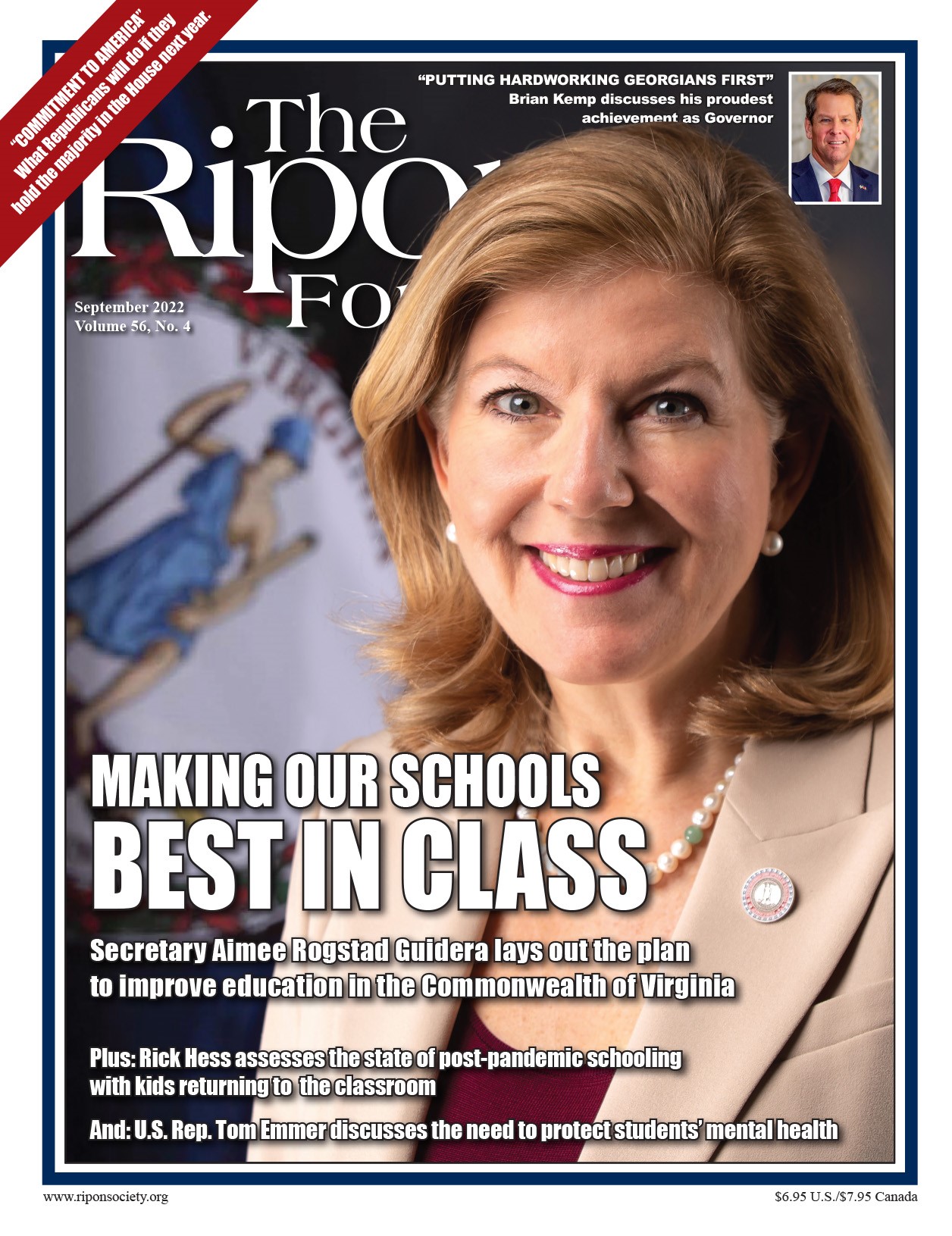With students returning to school this month, the latest edition of The Ripon Forum focuses on the effort to improve education in America and how the COVID-19 pandemic has impacted learning — and youth mental health — over the past two years.
Leading our coverage of this critical issue is Aimee Rogstad Guidera. Guidera serves as Secretary of Education for the Commonwealth of Virginia. In our lead essay, she writes about how student performance in the Commonwealth had begun to decline even before the pandemic, and the plan being put in place under the leadership of Governor Glenn Youngkin to improve education in Virginia schools in the years ahead.
“Recently released annual (Spring ‘22) test scores underscore the urgency of the crisis. In math, for example, only 66% of our students are passing the test of their grade level standards, and it is shockingly worse for our economically disadvantaged (52%), Black (42%), Hispanic (53%), and students with disabilities (39%). The results are similar for our science scores. When society accepts that half of our traditionally underserved student populations are not mastering critical grade level expectations, we are condemning them to a life of diminished possibilities.”
“Under Governor Youngkin, our North Star is high expectations aligned to the demands of the knowledge economy for every student and school. All learners must be empowered with multiple pathways to post-secondary success which provide valuable exposure to the world of work. Therefore, we are launching at least 20 lab schools which will bring together higher education, employers, schools, and community partners to provide innovative approaches to raising student achievement while also building bridges with the world outside school walls.”
Guidera goes on to detail further efforts the Youngkin Administration will be launching, including more fully engaging and empowering parents and teachers, whom she calls “the two most important factors in student success.”
Also writing in this latest edition is American Enterprise Institute Scholar Frederick Hess, who examines the state of schooling in the wake of the pandemic and why policymakers must make every effort to help students catch up. “Researchers have found that students lost the equivalent of one-third to one-half of a year in reading, and nearly twice that in math,” Hess writes, referring to the impact of closures and shutdowns on American youth. Referring to the “disruption, politics, and assorted nonsense” that has plagued education over the past few years, Hess also urges public officials and school leaders “to eschew the sideshows and focus on getting kids back on track.”
According to U.S. Rep. Tom Emmer (MN-6), policymakers also need to focus on the mental health of students, which, he writes, also took a hit over the past two years. “The CDC found earlier this year that 37 percent of high school students reported suffering from persistent mental health struggles, including stress, anxiety, and depression during the pandemic,” the lawmaker writes. “The earlier we help our youth who are struggling, the more likely we will be able to ensure a productive and prosperous future for the next generation.”
One other way to help students, writes Martin Lueken of EdChoice, is by providing them an option of where they go to learn. “Educational choice,” Lueken argues, “is a commonsense policy to fix the adverse incentives underlying the public [school] system by placing parents where they belong: in the driver’s seat of their own children’s education.”
In addition to examining the effort to improve education in Virginia and elsewhere across the country, the latest Ripon Forum also examines the pledge being made by Republicans in their “Commitment to America,” which sets forth the agenda the party will pursue if it holds a majority in the House of Representatives next year. Writing essays in this regard are six of the seven Task Force Chairs responsible for developing this agenda.
The Chairs writing for the Forum include: U.S. Rep. Cathy McMorris Rodgers (WA-5) of the Big Tech Task Force; U.S. Rep. Michael McCaul (TX-10) of the China Task Force; U.S. Rep. John Katko (NY-24) of the Task Force on America Security; U.S. Rep. Patrick McHenry (NC-10) of the Task Force on Jobs and the Economy; Garret Graves (LA-6) of the Energy, Climate, and Conservation Task Force; and, U.S. Reps. Vern Buchanan (FL-16) & Brett Guthrie (KY-2) of the Healthy Future Task Force.
And in our latest Ripon Profile, Brian Kemp discusses his proudest achievement as Governor of Georgia and some of the key challenges facing the people of his state.
As always, we hope you find this latest edition of The Ripon Forum interesting and informative, and we welcome any comments or questions you might have.
Lou Zickar, Editor of The Ripon Forum
louzickar@clu.ccw.mybluehost.me





